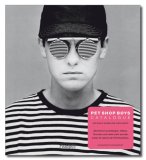Novedades bibliográficas musicales por Bob Stanley

Artículo publicado en The Times por mi gurú favorito.
Impagable la cita que destaca de Neil Tennant a próposito del You Only Tell Me You Love Me When You´re Drunk"
(“People perceive You Only Tell Me You Love Me When You’re Drunk as ironic,” Neil Tennant complains, “when in fact it’s a painfully heartbreaking song to me, because it’s so true.”)
E impagables también las demás citas que subraya Stanley (como la de Sade o la de Everett True respecto a Nirvana). Un Lince este Bob.
NO BIG BEATLES OR ELVIS tomes emerged in 2006, leaving the way for the super- middleweights to enter the ring. Brian Wilson hasn’t been served by a decent biography since David Leaf’s long out-of-print The Beach Boys. Peter Ames Carlin’s Catch A Wave (Rodale, £18.99/offer £16.99) is neither fawning — as much of the post-Smile press has been — nor lightweight. His writing has a New Yorker-like authority, droll enough to dismiss the Beach Boys’ MIU Album with “the horror, the horror”.
England’s best-loved Boys, the Pet Shop kind, have delivered Catalogue (Thames & Hudson, £29.95/£26.95), which proves how consistently great their artwork has been, even if the music has occasionally wobbled. Raised eyebrow dryness is leavened by their very real, English melancholy. “People perceive You Only Tell Me You Love Me When You’re Drunk as ironic,” Neil Tennant complains, “when in fact it’s a painfully heartbreaking song to me, because it’s so true.”
Tennant’s previous job was on the magazine Smash Hits, whose demise earlier this year is mourned in The Best Of Smash Hits (Sphere, £14.99/ £13.49). Although heavy on nostalgia, thankfully it reproduces in full Tom Hibbert’s extraordinary 1987 interview with Margaret Thatcher. Never afraid to reduce superstars such as “Dame David Bowie” (another Hibbert-ism) to the level of Nik Kershaw, “ver Hits” also found room for Sade’s hot kitchen tips: “I had some goat’s cheese for the first time yesterday. I was very impressed.”
Cum On Feel the Noize (Carlton, £14.99/£13.49), Alan Parker and Steve Grantley’s story of Slade, emerges in a similar pop annual format. It’s good (or “gud”) to discover that their habit of deliberately misspelling song titles began when Noddy Holder wrote Because I Love You on a tape box and it looked “soppy”. Coz I Luv You was the the first of six No 1s. Kurt Cobain once described Slade as “a band that would never bend over”.
Nirvana were similarly unbendable, although commercial success proved too much for Cobain. Nirvana: The True Story (Omnibus, £19.95/£16.95) is so titled because it is by Everett True, a Melody Maker journalist who was the singer’s confidante. “People say Nirvana changed everything,” True frowns, “but what exactly did Nirvana change? They made it easier for Smashing Pumpkins, Bush, Pearl Jam and a bunch of crap bands to sell a load of records.”
Such is the fate of pop pioneersIn the second of the Labels Unlimited series, Rob Young chronicles Rough Trade (Black Dog, £19.95/£16.95). Home to post-punk heroes such as the Fall, Raincoats and Pop Group, their startling roster has provided sustenance for seemingly every new group to emerge since the Strokes. Yet reading a “dunno, y’know, whateva” interview with the Brazilian group CSS recently, I pined for the fiercely monochrome worldview of the original acts. The Pop Group’s Mark Stewart claimed that “capitalism is the most barbaric of all religions”: much as I like the Long Blondes, I can’t imagine them sounding so full of ire.
Too cool to appear on Top of the Pops, the Clash still ended up playing London Calling on Tiswas to a bunch of ten-year-olds. Chris Salewicz’s Joe Strummer biography, Redemption Song (HarperCollins, £20/£18), will fuel further debate on the man. One example. Salewicz has just been involved in a Notting Hill carnival riot with Strummer: “Two days later my phone rang. ‘All the pussy men ran to the back of the house but you stood by me. Thanks,’ breathed a familiar voice. ‘No problem, Joe,’ I said. I was very touched that he was so touched. I remember when he told the story to my new girlfriend. Then he looked at her tits. ‘Gosh,’ he said, rather spoiling the moment.”
Chronicles: Volume 1 did the job that Dylan On Dylan (Hodder & Stoughton, £18.99/£16.99) falls amusingly short on. It reprints a 1980 interview: “Once I’ve said what I need to say in a song, that’s it. I don’t want to repeat myself.” Precisely.
Better to look at the pictures in Catalogue, Rough Trade or Matthew Robertson’s Factory Records: The Complete Graphic Album (Thames & Hudson, £29.95) Peter Saville´s artwork will, I’d wager, outlast Nirvana’s music or Strummer’s politics
0 comentarios